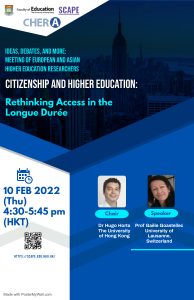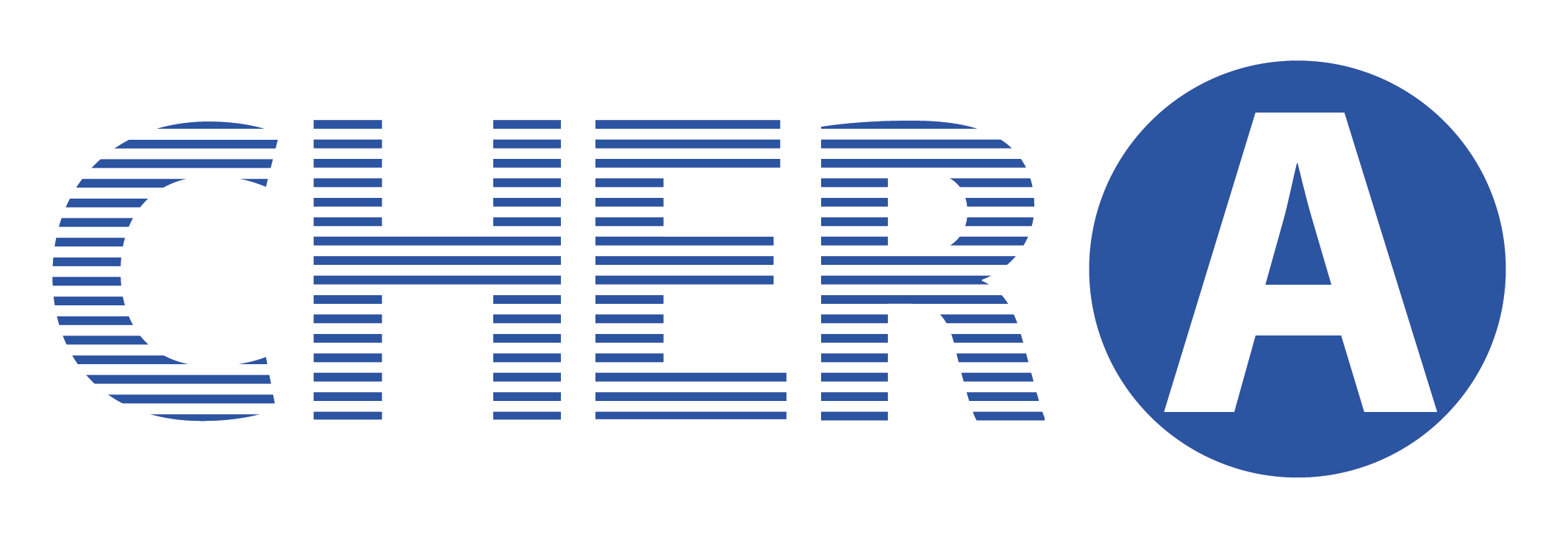Ideas, Debates, and More: Meeting of European and Asian Higher Education Researchers
Citizenship and Higher Education: Rethinking access in Longue Durée
Speaker: Professor Gaële GOASTELLEC The The University of Lausanne, Switzerland
Chair: Dr Horta HUGO The University of Hong Kong, Hong Kong
Date: 10 February 2022 (Thursday)
Time: 16:30-17:45 (HK Time) by zoom
Registration: Click here
Abstract
A large body of research on higher education questions the social characteristics of students and the determinants of access. Sociologists and historians alike have documented differential access according to social, economic, ethnic or geographical background, as well as gender (Bourdieu & Passeron, 1964, 1970; Boudon, 1973; Anderson, 2004; Arum et al, 2007; Julia & Revel, 1989, etc.). However, little research questions the relationship between higher education and citizenship, and when it does, it is mainly on how higher education could contribute to citizenship education (Zgaga, 2009; Horey et al, 2018; Cheng & Holton, 2018; Fernandez, 2005, etc.). How citizenship affects access opportunities and vice versa has been little discussed, although, as we will show using a European perspective, it represents a historical and widely shared driver of access organisation.
The concept of citizenship, understood in a broad sense, defines what binds an individual, his rights and duties, to a political territory. It is disconnected from the type of political regime in place: citizenship ‘can exist without democracy: (…) the rights and duties associated with the status of citizen can be decided and attributed by those who govern (…)’ (Bickel, 2007: 12).
Therefore, ‘not all regimes of rights and citizenship are similar and not all are national’ (Burbank & Cooper, 2008), and citizenship is not only associated with modern states (Magnette, 2001). Therefore, the concept of citizenship comprises ‘multiple meanings (…)’ (Bickel, 2007, pp. 12-14), ‘concentrates a complex stratification of multiple meanings going back to different historical periods’ (Koselleck, 1979/1990, p. 109) and is variously associated with different social affiliations over time.
What can we learn by interrogating access to university through the lens of citizenship? We argue that the instrumentation of access relies on a grammar of citizenship that is both linked to social stratification and to the framing of geographical circulations.
In order to document this, based on a socio-historical work on the history of access to universities in Europe (Goastellec, 2020), this presentation will recall how the rights and duties of university members were the very first issue of negotiations between the university and the authority. A second part will document the dynamics that circumscribe the categories of citizens with access rights and the reciprocal effect of studies on access to citizenship. A third part will focus on the interactions between student circulation and political citizenship. Finally, in the fourth part we will contrast the diffusion of a so-called universal citizenship with the permanence of a differentiation of citizenship. The conclusion, based on a synthesis of the identified processes, will problematise how such research offers the opportunity to adopt a ‘relational stance’: by identifying the connections between the different territories and scales articulated in the instruments of access, we will highlight the contribution of the articulation of access and citizenship to the global historical development (Go & Lawson, 2017).
References
- Anderson, R. D. (2004). European universities from the Enlightenment to 1914. Oxford Scholarship Online.
- Arum, R., Gamoran, A., & Shavit, Y. (2007). More inclusion than diversion: Expansion, differentiation, and market structure in higher education. In Y. Shavit, R. Arum, & A. Gamoran (Eds.), Stratification in higher education, A comparative study (pp. 1–38). Stanford University Press.
- Bickel, Jean-François. 2007. « Significations, histoire et renouvellement de la citoyenneté ». Gérontologie et société, vol. 30 / 120, (1), 11-28.
- Boudon, Raymond. 1973. L’inégalité des chances, la mobilité sociale dans les sociétés industrielles. Paris, Colin.
- Bourdieu, Pierre et Jean-Claude Passeron. 1964. Les héritiers. Les étudiants et la culture. Paris, Éditions de Minuit.
- Bourdieu, Pierre et Jean-Claude Passeron. 1970. La reproduction. Éléments pour une théorie du système d’enseignement. Paris. Éditions de Minuit.
- Burbank, Jane et Frederick Cooper. 2008. « Empire, droits et citoyenneté ». Annales. Histoire, Sciences Sociales, 63(3), 495-531.
- Cheng, Y., & Holton, M. (2018). Geographies of citizenship in higher education: An introduction. AREA , 51 (4), 613–617.
- Fernandez, Ó. (2005). Towards European citizenship through higher education? European Journal of Education , 40 (1), 59–68.
- Goastellec, Gaële. (2019). « L’accès à l’enseignement supérieur enjeu de l’organisation sociale : quelques apports de la comparaison socio-historique ». SociologieS. https://journals.openedition.org/sociologies/12152
- Goastellec, G. (2020). Production de l’université, production de la société. Sociologie de l’accès à l’université depuis le moyen âge [Habilitation à Diriger les Recherches]. Institut d’Étude Politique de Paris.
- Goastellec, G., (2021) Citizenship and Access to Higher Education: the missing piece. In Eggins H., Smolenseva, A., De Wits H., Higher Education: the next decade, Brill.
- Go, J., & Lawson, G. (2017). Global historical sociology. Cambridge University Press.
- Horey, D., Fortune, T., Nicolacopoulos, T., Kashima, E., & Mathisen, B. (2018). Global citizenship and higher education: A scoping review of the empirical evidence. Journal of Studies in International Education , 22 (5), 472–492.
- Koselleck, R. (1990). Le futur passé. Contribution à la sémantique des temps historiques. Editions de l’EHESS. (Original work published 1979)
- Magnette, P. (2001). La citoyenneté : Une histoire de l’idée de participation civique. Bruylant.
- Zgaga, P. (2009). Higher education and citizenship: “The full range of purposes.” European
- Educational Research Journal, 8(2), 175–188.
Speaker
Gaële Goastellec is a sociologist. Her main research interests lie in the relationship between education and social organizations, analyzed through the socio-historical comparison of higher education systems and institutions. A first stream of research deals with access to Higher Education (from Middle Ages to Contemporary Europe and on a global scale for the 20th century), with a special concern for social belongings’ categorization and its translation into admission policies. Her most recent research focus on exiles opportunities to access HE depending on national administrative categorizations of refugees. A second line of research analyzes academic careers (also through international comparisons) and HE organizations.
Professor (MER) at the University of Lausanne, Switzerland, she is the director of the Observatory Science, Policy and Society (OSPS). Current vice-President of the AISLF research committee on International Comparisons, elected member of the Academia Europaea, she has previously been a Lavoisier Fellow (2004-2005) and a Fulbright New Century Scholar fellow (2005-2006).
Amongst her last publications, Kamanzi C., Goastellec G., Pelletier L,, (2021). Mass University and Social Inclusion: the Paradoxical role of Public Policies. Social Inclusion, vol.9, N°3, pp.32-43. https://www.cogitatiopress.com/socialinclusion/article/view/4165; Goastellec, G., (2021) Citizenship and Access to Higher Education: the missing piece. In Eggins H., Smolenseva, A., De Wits H., Higher Education: the next decade, Brill; with Jussi Välimaa (Eds), 2019, Inequalities in Access to Higher Education: Methodological and Theoretical Issues, Social Inclusion, Vol7, N°1, . https://www.cogitatiopress.com/socialinclusion/issue/view/101 ; with Marie-Agnès Détourbe (2018), « Revisiting the issues of access to Higher Education and social stratification through the case of refugees: a comparative study of spaces of opportunity for refugee students in Germany and England” », Social Sciences, vol7(186), https://www.mdpi.com/2076-0760/7/10/186.

